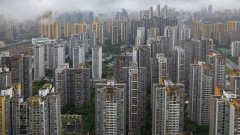(New York Electric) sources revealed that the Chinese regulatory authorities are considering recovering unsolvable plots from trapped developers, and land purchase funds will be used to ensure the delivery of real estate projects that have been suspended.
According to Bloomberg, people familiar with the matter said that the Ministry of Housing and Urban -Rural Development is evaluating the plan with other regulatory authorities, and it is unclear whether the decision -making level will be approved.Chinese law stipulates that local governments can be recovered from developers without developing land for two years without compensation.
A person familiar with the matter analyzed that if the above plan is approved to be implemented, it means that the government department has a large space due to the city's policy, including recovering the land from the dilemma developers, pledged to a better financial health developer, and a better financial health developer.To complete the stoppage project.Other operations include the government re -planned the recycled land.
This plan is one of the several stable real estate market measures that regulators are considering to prevent the risk of real estate markets from intensifying, thereby triggering a larger social problem.The primary goal of the "Insurance of the Insurance" also shows that the regulatory authorities give priority to buyers rather than bond holders.
Kerry data shows that as of the end of last year, the top 100 developers in China had a value of about 42.5 trillion yuan (S $ 8.70 trillion) of the soil storage value.Among them, a large number of companies have paid large -scale debt to buy land, hoping that the price can continue to rise.
The Chinese government has demanded deleveraging in the real estate industry for many years, and it is continuously affecting housing prices, land prices and new commercial housing sales. Many dilemma developers hold land and are weak or unwilling to develop.According to Caixin's previous report, the first batch of land transferred to the first batch of centralized bidding last year had only 37%of the end of March, and about 16%of the land transferred in the second round.




